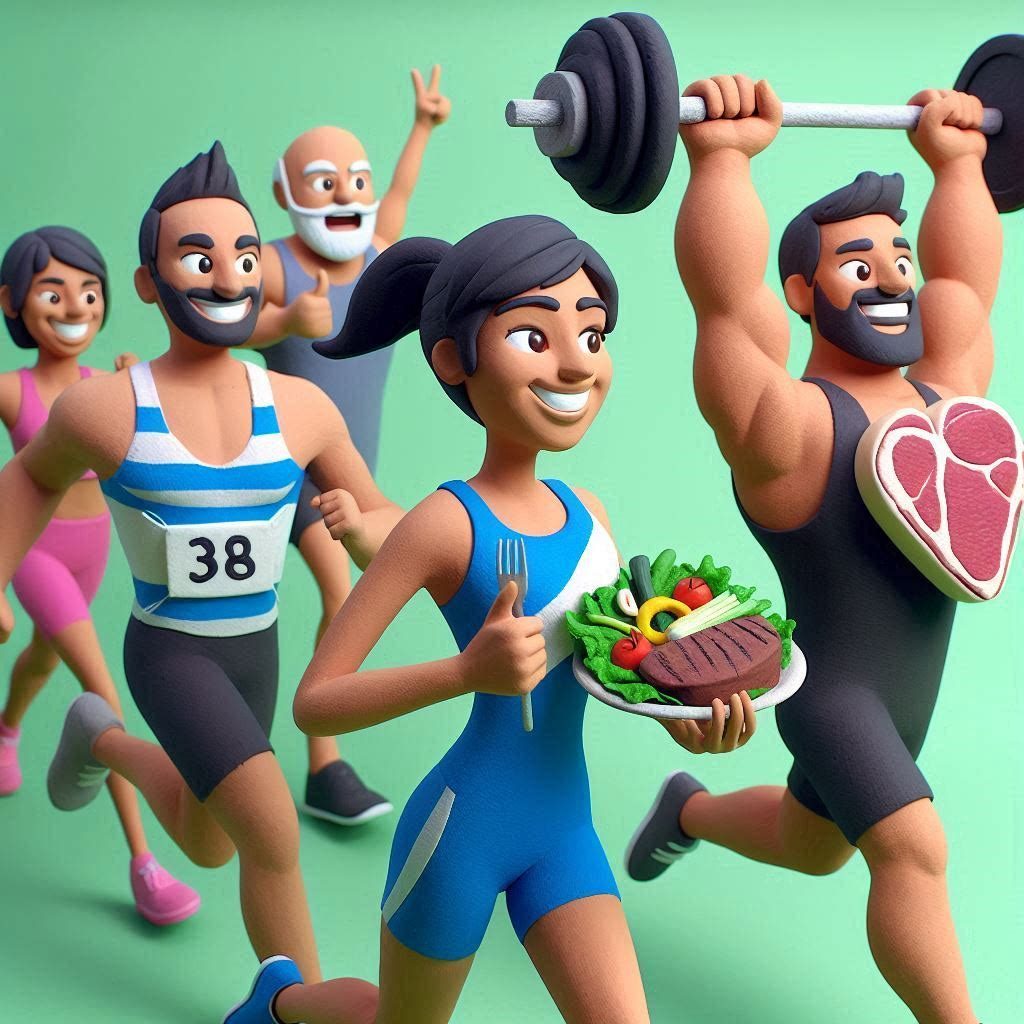Vegetarian Athletes Compete With Meat-Eaters?
Vegetarian Athletes – Can They Compete with Meat-Eaters?
Introduction
The question of whether a vegetarian diet can support the same level of athletic performance as a meat-based diet is a topic of much debate. With an increasing number of athletes adopting vegetarian diets, it’s clear that plant-based nutrition is gaining traction in the sports world. But can vegetarians truly compete with their meat-eating counterparts?
Disclaimer
The information provided in this blog post is for general informational purposes only. While we strive to keep the information up-to-date and correct, there are no representations or warranties, express or implied, about the completeness, accuracy, reliability, suitability, or availability with respect to the information, products, services, or related graphics contained in this blog post for any purpose. Any use of this information is at your own risk.
The author is not a dietitian or nutrition professional. The content is not intended to be a substitute for professional medical advice, diagnosis, or treatment. Always seek the advice of your physician or other qualified health provider with any questions.
The Vegetarian Athlete
Vegetarian athletes are individuals who follow a plant-based diet, abstaining from consuming meat and sometimes other animal products. There are different types of vegetarian diets, including lacto-vegetarian, ovo-vegetarian, and vegan. Each of these diets has its own unique characteristics and nutritional profiles.
Vegetarianism and Strength
——————————–
A Complex Relationship
One of the common concerns when switching to a vegetarian diet is whether it will affect strength and performance. The relationship between vegetarianism and strength is complex and depends on several factors.
Protein and Strength
Protein plays a crucial role in muscle repair and growth, which directly impacts strength. While meat is a well-known source of protein, vegetarian diets can also provide ample protein through foods like lentils, chickpeas, tofu, and quinoa. With a well-planned vegetarian diet, athletes can meet their protein needs and maintain their strength.
Research Findings
Research on the impact of vegetarian diets on strength has shown mixed results. Some studies suggest that vegetarian athletes can perform just as well as their meat-eating counterparts, including in strength-related parameters. However, other research indicates potential challenges with vegetarian diets in relation to strength performance.
Individual Factors
The impact of a vegetarian diet on strength can vary based on individual factors, including the type of sport, training volume, and individual physiology. Therefore, vegetarian athletes, particularly those engaged in strength sports, may need to pay extra attention to their diet to ensure they’re getting the necessary nutrients for optimal performance.
Strength & The Vegetarian Diet
A vegetarian diet does not necessarily lead to decreased strength. With careful planning and consideration of individual nutritional needs, vegetarian athletes can maintain and even improve their strength. As always, it’s recommended to consult with a healthcare provider or a nutrition professional when making significant dietary changes.
This section adds another layer to our understanding of vegetarian diets in the context of athletic performance, showing that with the right approach, vegetarian athletes can compete on an equal footing with those following meat-based diets.
Nutritional Considerations
One of the primary concerns for vegetarian athletes is getting enough protein, which is crucial for muscle repair and growth. While meat is a common source of protein, there are plenty of plant-based alternatives. Foods like lentils, chickpeas, tofu, and quinoa are all excellent sources of protein.
Another important nutrient for athletes is iron, which is involved in oxygen transport and energy metabolism. While iron is present in both plant and animal foods, it’s more readily absorbed from animal sources. However, consuming vitamin C-rich foods alongside iron-rich plant foods can enhance iron absorption.
Performance Comparison
Several studies have shown that vegetarian athletes can perform just as well as their meat-eating counterparts. A balanced vegetarian diet can meet all the nutritional needs of an athlete, and with proper planning and attention to nutrient timing, vegetarian athletes can excel in their sports.
Case Studies
There are numerous examples of successful vegetarian athletes across a range of sports. For instance, Carl Lewis, one of the greatest track and field athletes of all time, adopted a vegan diet during his career and claimed it improved his performance.
Nutrients More Abundant in Meat-Based Diets
While a vegetarian diet can be rich in certain nutrients, there are some that are more abundant in meat-based diets.
Vitamin B12
Vitamin B12 is an essential nutrient that plays a vital role in red blood cell formation, cell metabolism, nerve function, and the production of DNA. The natural sources of Vitamin B12 are almost exclusively animal-based, including fish, meat, poultry, eggs, milk, and milk products.
Creatine
Creatine is a molecule that’s produced in the body and found in various amounts in foods like red meat, poultry, and fish. It’s stored in skeletal muscle and used for energy during high-intensity exercise.
Carnosine
Carnosine is a dipeptide molecule, made up of two amino acids, histidine and beta-alanine. It’s found in high concentrations in skeletal muscle, and it’s known to reduce lactic acid accumulation in your muscles during exercise, which leads to improved athletic performance.
Vitamin D3 (Cholecalciferol)
Vitamin D3, or cholecalciferol, is one of the two main forms of vitamin D. It’s a fat-soluble vitamin that your body produces when your skin is exposed to sunlight. It’s also found in certain types of fatty fish and in fortified dairy products.
Docosahexaenoic Acid (DHA)
DHA is a type of Omega-3 fatty acid that’s primarily found in fatty fish. It’s important for brain health and is particularly beneficial for athletes due to its anti-inflammatory effects.
Heme-Iron
Iron is a mineral that’s vital for health. The two types are heme, which is found in animal products, and non-heme, found in plants. Heme iron is more readily absorbed by the body, making it an important consideration for vegetarians.
Taurine
Taurine is an amino acid that’s important for heart health and muscle function. It’s found naturally in meat, fish, and dairy products.
While these nutrients are more abundant in meat-based diets, they can be obtained from other sources or supplements to ensure vegetarians and vegans meet their nutritional needs. As with any diet, individual needs will vary based on various factors, so it’s always a good idea to consult with a healthcare provider or a nutrition professional.
Energy Levels in Vegetarian and Meat-Eating Athletes
When it comes to energy levels in sports, the type of diet an athlete follows can play a significant role. However, it’s not as simple as saying one diet is superior to another. Both vegetarian and meat-based diets have their own unique benefits and considerations.
Energy Sources
The primary source of energy for all athletes, regardless of diet, is carbohydrates. Carbohydrates are broken down due to many reason into glucose, which is used by the body for energy over time. Both vegetarian and meat-based diets can provide ample carbohydrates.
Protein and Energy
Protein, while not a primary source of energy, is crucial for muscle repair and growth, which can impact an athlete’s energy levels and performance. Meat is a well-known source of protein, but vegetarian diets can also provide ample protein through foods like lentils, chickpeas, tofu, and quinoa.
Research Findings
Research on the impact of vegetarian diets on energy levels in athletes has shown mixed results. Some studies suggest that athletes following a vegetarian diet can have similar energy levels to those consuming a meat-based diet. However, other research indicates potential challenges with vegetarian diets in relation to energy levels.
Individual Factors
The impact of a vegetarian diet on energy levels can vary based on individual factors, including the type of sport, training volume, and individual physiology. Therefore, vegetarian athletes may need to pay extra attention to their diet to ensure they’re getting the necessary nutrients for optimal energy levels.
A vegetarian diet does not necessarily lead to decreased energy levels. With careful planning and consideration of individual nutritional needs, vegetarian athletes can maintain and even improve their energy levels. As always, it’s recommended to consult with a healthcare provider or a nutrition professional when making significant dietary changes. This will ensure that the diet is well-balanced and meets the individual’s specific needs. With the right approach, vegetarian athletes can compete on an equal footing with those following meat-based diets.
Conclusion
In conclusion, a vegetarian diet can support athletic performance at all levels. The key is to ensure a well-planned diet that meets energy and nutrient needs. As with any diet, individual needs will vary based on the sport, training volume, and individual physiology.
Therefore, it’s always a good idea for athletes considering a vegetarian diet to consult with a sports dietitian or nutrition professional.
By understanding the nutritional needs and maintaining a balanced diet, vegetarian athletes can not only match, but potentially exceed, the performance of their meat-eating counterparts. The rise of successful vegetarian athletes serves as a testament to this.
So, whether you’re a weekend warrior or a professional athlete, don’t let dietary choices limit your performance. With the right approach, vegetarian athletes can compete with anyone.
Join the Conversation
We’ve explored the nutritional considerations for vegetarian athletes and the nutrients more abundant in meat-based diets. But what are your thoughts? Are you a vegetarian athlete who’s found effective ways to meet your nutritional needs? Or perhaps you’re a meat-eater considering a switch to a plant-based diet?
Share your experiences, tips, and questions on this topic in the comments below. Let’s create a supportive community where we can learn from each other and navigate the path to optimal performance, regardless of dietary choices.
Looking forward to hearing your thoughts!
#VegetarianAthlete #PlantBasedAthlete #VeggieSports #PlantPoweredAthlete #VeganFitness #VegetarianFitness #PlantBasedPerformance #VeggieStrength #VeganMuscle #VegetarianHealth #PlantBasedHealth #VeganRunner #VegetarianRunner #PlantBasedRunner #VeganCyclist #VegetarianCyclist #PlantBasedCyclist #VeganSwimmer #VegetarianSwimmer #PlantBasedSwimmer #VeganGymnast #VegetarianGymnast #PlantBasedGymnast #VeganSportNutrition #VegetarianSportNutrition #PlantBasedSportNutrition #VeggieEndurance






You have noted very interesting points! ps decent website .